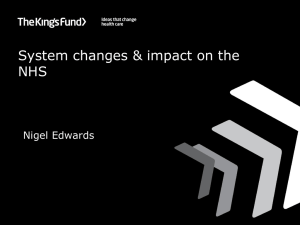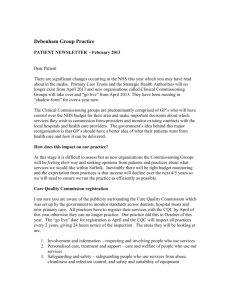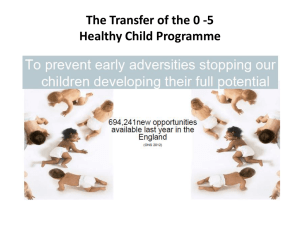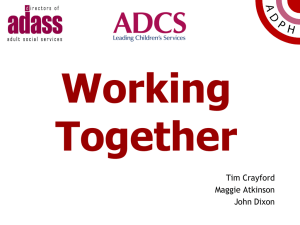REPORT OF THE LEAD MEMBER FOR ADULT SOCIAL CARE CABINET MEETING
advertisement
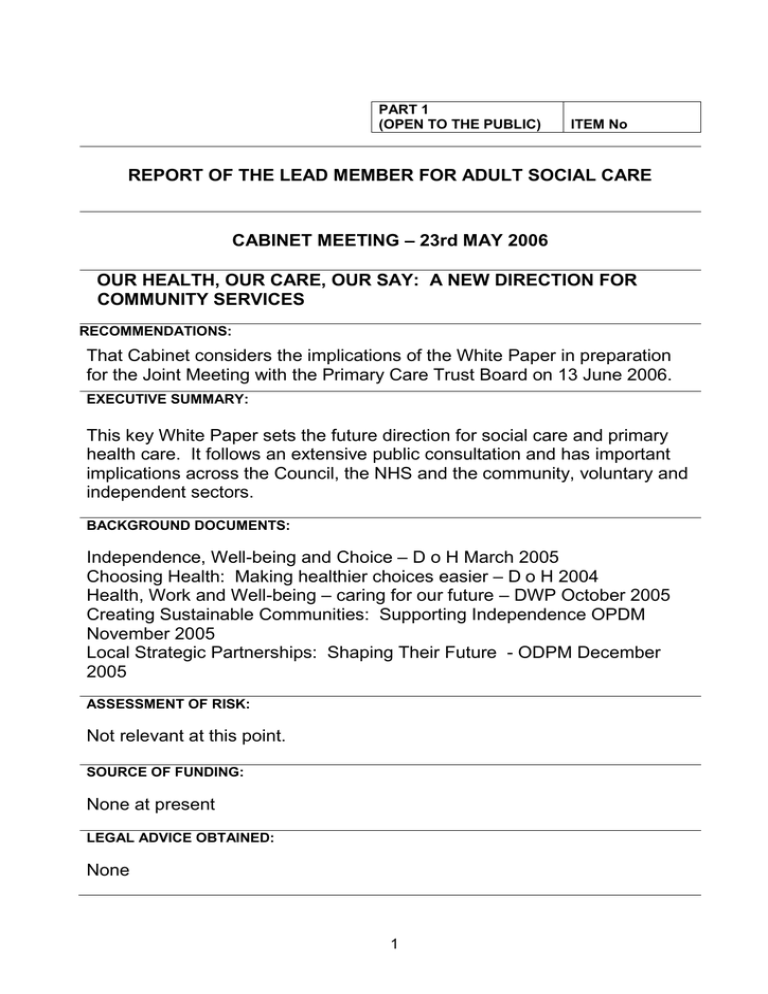
TITLE : PART 1 (OPEN TO THE PUBLIC) ITEM No REPORT OF THE LEAD MEMBER FOR ADULT SOCIAL CARE CABINET MEETING – 23rd MAY 2006 OUR HEALTH, OUR CARE, OUR SAY: A NEW DIRECTION FOR COMMUNITY SERVICES FORECOMMENDATIONS: That Cabinet considers the implications of the White Paper in preparation for the Joint Meeting with the Primary Care Trust Board on 13 June 2006. EXECUTIVE SUMMARY: This key White Paper sets the future direction for social care and primary health care. It follows an extensive public consultation and has important implications across the Council, the NHS and the community, voluntary and independent sectors. BACKGROUND DOCUMENTS: Independence, Well-being and Choice – D o H March 2005 Choosing Health: Making healthier choices easier – D o H 2004 Health, Work and Well-being – caring for our future – DWP October 2005 Creating Sustainable Communities: Supporting Independence OPDM November 2005 Local Strategic Partnerships: Shaping Their Future - ODPM December 2005 ASSESSMENT OF RISK: Not relevant at this point. SOURCE OF FUNDING: None at present LEGAL ADVICE OBTAINED: None 1 FINANCIAL ADVICE OBTAINED: No CONTACT OFFICER: Anne Williams – 0161 793 2200 WARD(S) TO WHICH REPORT RELATE(S): All KEY COUNCIL POLICIES: PURPOSE OF REPORT: To brief members about the White Paper which sets the future direction for social and primary health care. CONSULTATION: There was widespread consultation locally and nationally on “Independence, Well-being and Choice” and “Your Health, Your Care, Your Say”, earlier consultation papers. DETAIL: 1. INTRODUCTION 1.1 In February 2006 the Government published a White Paper, “Our Health, Our Care, Our Say: a new direction for community services.” The White Paper follows a Green Paper, “Independence, Well-being and Choice” on the future of Adult Social Care and extensive national and local consultation. 1.2 The White Paper sets the direction for the future development of community based health services and adult social care. It addresses the major challenges facing local government and the NHS in tackling health inequalities, an aging population and the very significant and growing percentage of the population with long term needs such as diabetes, stroke, high blood pressure and cardio vascular conditions. It is addressed to the NHS and Councils as a whole. 1.3 The White Paper makes extensive links with other Government policies such as the development of Local Strategic Partnerships, the thinking around devolution of certain responsibilities to 2 neighbourhoods, the future funding of social care (the Wanless report), Every Child Matters, the employability agenda, and the importance of regeneration in building sustainable communities and in securing housing for a changing population. 2. KEY MESSAGES 2.1 Personal control and empowerment Giving people more personal choice and control over their health and social care through: Better information and access to services An increased take up of Direct Payments The introduction of individual budgets bring together several income streams from social care, equipment, access to work, Independent Living Fund, Disabilities Facilities Grants and Supporting People The development of Personal Health and Social Care Plans The development of integrated social and health care records Care closer to home with more services delivered in the communities More self care through the expert patient programme, telemedicine and telecare 2.2 A radical and sustained shift to better prevention services and earlier intervention “We will shift the whole system towards the active, engaged citizen in his or her local communities. Closer working between Local Government, through Primary Care Trusts and GP practices. An NHS “Life Check” – assessment on line or in hard copy Specific health and social care advice and support 3 The development of a campaign for a “Fitter Britain” A shift in spending from hospitals to primary and social care 2.3 Better future planning, commissioning and procurement between Primary Care Trusts and Local Authorities Through Director of Public Health as a joint appointment with a wider role A strengthened role for the Director of Adult Social Services within the Local Authority. The Director of Adult Social Services, the Director of Public Health working across local authorities, undertaking regular strategic needs assessments which look forward over 10 to 15 years and take account of the needs of the whole population The development of a procurement model and best practise guidance to underpin a joint commissioning framework for health and well-being The streamlining of budgets and planning cycles between Primary Care Trusts and Local Authorities More joint appointments A shared outcome-based performance framework Aligned performance assessment and inspection regimes Local Area Agreements as key mechanism for joint planning and delivery 2.4 Integrated health and social care services through: A Common Assessment Framework An integrated health and social care information system Creation of multi-disciplinary networks and teams 4 More use of integrated intermediate care Co-ordinated services for Carers 2.5 A summary of key points is shown in the attached appendix. 3. Implications and opportunities for the Council 3.1 The opportunities: A Single White Paper a good news and recognises the vital contribution Local Government makes to the health and wellbeing of local people Political, strategic and operational leadership and trust between the Council and the PCT is a strength in Salford The broadening role of social care to well-being and inclusion fits with the Council’s grouping of Neighbourhood, Culture, Leisure and Adult Social Care in one Directorate The Council and Primary Care Trust already have several joint appointments, integrated services and pooled budgets, with plans for more developments this year The Council and Primary Care Trust are already working on the reduction of health inequalities and joint commissioning The Council and PCT have developed the Well-being Strategy for Older People and there is cross Council engagement with its implementation The Council is a high performer in the uptake of Direct Payments Plans are advanced across social care and housing for the use of telecare A strategy for housing for older people is being developed 5 A cross Council group is engaged with the employability agenda 4. Implications for the Council 4.1 The challenges There remain stark health inequalities in Salford across socioeconomic groups and in different communities. The financial position in the NHS and Local Authorities is forcing withdrawal from preventive services and tightening of eligibility criteria. Historically, it has proved very difficult to move resources from secondary (hospital) care to primary care and from NHS to Local Government. Demographic change in relation to older people and children and adults with complex, multiple disabilities are a very significant pressure for Central and Local Government. Getting the governance right between the Primary Care Trust and the Council as more and more services/budgets/systems are integrated will require detailed work across Human Resources, I.T., Finance, Adult Social Care and Neighbourhood Services. Local Area Agreements are still new and the White Paper envisages large-scale agreements. Turbulence in the NHS and conflicting policies could be diverting and risky. If the changes in the White Paper are successfully implemented there will be a significant impact on the future shape of hospital services in terms of size and number. Working with GP’s and practise based commissioning is new and will require very careful planning to secure a smooth transition from existing arrangements and avoid destabilisation. 6 5. Conclusion 5.1 The White Paper, “Our Health, Our Care, Our Say” sets out an agenda for Primary Care Trusts and Local Government to meet people’s expectations for community health and social care services in the 21st century. If these expectations are to be met, a significant shift in resources and services will be required to develop more preventive services and early intervention, better joint commissioning and integrated services. Without these changes, demographic pressures threaten to overwhelm existing patterns of service. 5.2 The White Paper endorses the key role of Local Government as a whole in meeting this challenge, working with Primary Care Trusts. 5.3 The Council is well placed to implement the White Paper recommendations, working ever more closely with the Salford Primary Care Trust, the Local Strategic Partnership and providers in the Private and Voluntary Sector. 5.4 Implementation will require engagement and detailed work across the whole Council. 6. Recommendations 6.1 The Council, in considering the White Paper, will want to discuss with the Primary Care Trust, the implications in terms of future models of providing services. 6.2 The Council can link on-going work on the Research and Intelligence Unit with the new joint responsibility for a strategic needs assessment. AEW/AW May 2006 Cabinet Report 9 May Our Health, Our Care, our Say.doc 7
